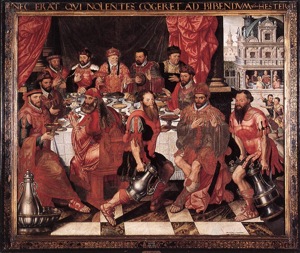Difference between revisions of "Banquet"
(Created page with 'File:lighterstill.jpgright|frame ==Origin== Middle French, from Old Italian banchetto, from diminutive of banca bench, bank *[http://en.wikipedia...') |
m (Text replacement - "http://" to "https://") |
||
| Line 3: | Line 3: | ||
==Origin== | ==Origin== | ||
Middle French, from Old Italian banchetto, from diminutive of banca bench, [[bank]] | Middle French, from Old Italian banchetto, from diminutive of banca bench, [[bank]] | ||
| − | *[ | + | *[https://en.wikipedia.org/wiki/15th_century 15th Century] |
==Definitions== | ==Definitions== | ||
*1: a sumptuous feast; especially : an elaborate and often [[ceremonious]] meal for numerous people often in [[honor]] of a person <a [[state]] banquet> | *1: a sumptuous feast; especially : an elaborate and often [[ceremonious]] meal for numerous people often in [[honor]] of a person <a [[state]] banquet> | ||
| Line 10: | Line 10: | ||
A '''banquet''' ([[English]]: /ˈbæŋk.wɪt/, French: [bɑ̃.kɛ]) is a large meal or feast, complete with main courses and desserts. It usually serves a [[purpose]] such as a [[charitable]] gathering, a [[ceremony]], or a celebration, and is often preceded or followed by [[speeches]] in [[honor]] of someone. | A '''banquet''' ([[English]]: /ˈbæŋk.wɪt/, French: [bɑ̃.kɛ]) is a large meal or feast, complete with main courses and desserts. It usually serves a [[purpose]] such as a [[charitable]] gathering, a [[ceremony]], or a celebration, and is often preceded or followed by [[speeches]] in [[honor]] of someone. | ||
==Historic Context== | ==Historic Context== | ||
| − | The [[idea]] of banqueting is ancient (see [ | + | The [[idea]] of banqueting is ancient (see [https://en.wikipedia.org/wiki/Sellisternium Sellisternium], [https://en.wikipedia.org/wiki/Belshazzar%27s_Feast Belshazzar's Feast], and [https://en.wikipedia.org/wiki/Mead_hall Mead halls]) In the sixteenth century a banquet was very [[different]] from our [[modern]] [[perception]] and stems from the [https://en.wikipedia.org/wiki/Middle_Ages medieval] 'ceremony of the void'. After dinner the guests would stand and drink sweet wine and spices while the table was cleared, or ‘voided’ (Later in the seventeenth century ‘void’ would be replaced with the French ‘dessert’). During the sixteenth century, guests would no longer stand in the great chamber whilst the table was cleared and the room [[prepared]] for [[entertainment]], but would retire to the parlour or banqueting room. |
| − | As the [[idea]] of banqueting [[developed]], it could take place at any time during the day and have much more in common with the later [[practice]] of taking tea. Banqueting rooms varied greatly from house to house, but were generally on an [[intimate]] scale either in a [[garden]] room or inside such as the small banqueting turrets in [ | + | As the [[idea]] of banqueting [[developed]], it could take place at any time during the day and have much more in common with the later [[practice]] of taking tea. Banqueting rooms varied greatly from house to house, but were generally on an [[intimate]] scale either in a [[garden]] room or inside such as the small banqueting turrets in [https://en.wikipedia.org/wiki/Longleat_House Longleat House]. |
==Contemporary times== | ==Contemporary times== | ||
[[Business]] banquets are a popular way to [[strengthen]] bonds between [[business]]men and their [[partners]]. It is common that a banquet is [[organized]] at the end of an [[academic]] [[conference]]. | [[Business]] banquets are a popular way to [[strengthen]] bonds between [[business]]men and their [[partners]]. It is common that a banquet is [[organized]] at the end of an [[academic]] [[conference]]. | ||
| − | A [ | + | A [https://en.wikipedia.org/wiki/Luau luau] is one variety of banquet originally used in Hawaii. |
| − | The [ | + | The [https://en.wikipedia.org/wiki/Nei_Mongol Nei Mongol] provincial government in China levies a [[tax]] on banquets. |
[[Category: Anthropology]] | [[Category: Anthropology]] | ||
[[Category: General Reference]] | [[Category: General Reference]] | ||
Latest revision as of 23:43, 12 December 2020
Origin
Middle French, from Old Italian banchetto, from diminutive of banca bench, bank
Definitions
- 1: a sumptuous feast; especially : an elaborate and often ceremonious meal for numerous people often in honor of a person <a state banquet>
- 2: a meal held in recognition of some occasion or achievement <an awards banquet>
Description
A banquet (English: /ˈbæŋk.wɪt/, French: [bɑ̃.kɛ]) is a large meal or feast, complete with main courses and desserts. It usually serves a purpose such as a charitable gathering, a ceremony, or a celebration, and is often preceded or followed by speeches in honor of someone.
Historic Context
The idea of banqueting is ancient (see Sellisternium, Belshazzar's Feast, and Mead halls) In the sixteenth century a banquet was very different from our modern perception and stems from the medieval 'ceremony of the void'. After dinner the guests would stand and drink sweet wine and spices while the table was cleared, or ‘voided’ (Later in the seventeenth century ‘void’ would be replaced with the French ‘dessert’). During the sixteenth century, guests would no longer stand in the great chamber whilst the table was cleared and the room prepared for entertainment, but would retire to the parlour or banqueting room.
As the idea of banqueting developed, it could take place at any time during the day and have much more in common with the later practice of taking tea. Banqueting rooms varied greatly from house to house, but were generally on an intimate scale either in a garden room or inside such as the small banqueting turrets in Longleat House.
Contemporary times
Business banquets are a popular way to strengthen bonds between businessmen and their partners. It is common that a banquet is organized at the end of an academic conference.
A luau is one variety of banquet originally used in Hawaii.
The Nei Mongol provincial government in China levies a tax on banquets.
